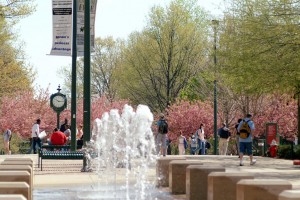From my point of view, success for graduate students in the United States is not merely the acquirement of knowledge, but is also the establishment of critical thinking and the process of developing our own argumentative edge. In order to achieve that kind of academic success, we have obtained various useful skills from the pathway program. Furthermore, our pathway program aims to help us to have preparations in advance from academic aspect before actually entering our own graduate program. And it also provide an opportunity to let us know the general rules in American campus and how we are supposed to be in western education environment. Therefore, from that standpoint, I think I have acquired a lot of benefits for my academic success.
As international students, most of us have faced more or less culture shock when firstly got to America. One of the most representative differences is the distinct pattern of academic writing between western and eastern educational background. In China, a student seems like a conduit of knowledge that is not supposed to argue with the sources. On the contrary, the academic writing in America ask for writing with argumentative edge which means students need to immerse themselves in a debate or in critical thinking and find a new terrain where no one else has explored. As a result, our pathway courses introduce much about academic life under western education so as to take actions for making sure the international students successfully adapt to the western academic world.
When thinking about what I learned from my pathway program, the first thing that comes into my mind is citation in academic writing which is an essential element for successful graduate study and also an important portion that we have learned a lot in our pathway courses. As we all know, citing is one of the most natural action in journal articles when the author would like to have conversation or interaction with other scholars. And as a graduate students, writing academic articles is an unavoidable and essential process. However, for international students like me, we rarely know about the rules or regulations of citations in America. So the EAP courses helped us to gain that kind of knowledge. For example, there are several options when citing such as direct quote or paraphrase, and integrated or non-integrated citations. And if the author chooses in-text citations with integrated reference information, the application of reporting verbs is cautious on account of its representative for a specific stance of the author him/ herself. Thus, after knowing about it, I felt that this knowledge of academic writing will be helpful both for correctly expressing myself when coming out with my own articles in the future and for effectively receiving the authors’ attitude when reading academic journal in my field.
In addition, in graduate academic life, before we can produce our own articles, the first step we need to spare no effort to do is reading. Both reading notebooks and the lecture can build up our academic background. In order to help international students to have strategies reading lecture, in the EAP classes, we are supposed to read a set of journal articles and analyze them according to a particular procedure. For instance, the analytical summary for every article usually practice me to find out rhetorical elements such as the object, purpose, main findings, relevance and so on. After the professors’ feedback, I can recognize the shortcomings of my own work and revise. This interactive process really improve my ability to rapidly extract valuable information from an academic article. And this skill is productive and efficient as well when applying in my own field.
In a word, the most important elements for successful graduate study, in my opinion, are academic writing’s citation rules and journal article reading skills. And through our pathway courses, the international students like me are trained of these necessarily required skills, so that it will be smoother for us to accomplish missions in our own discipline and to finally achieve our academic success.
